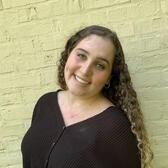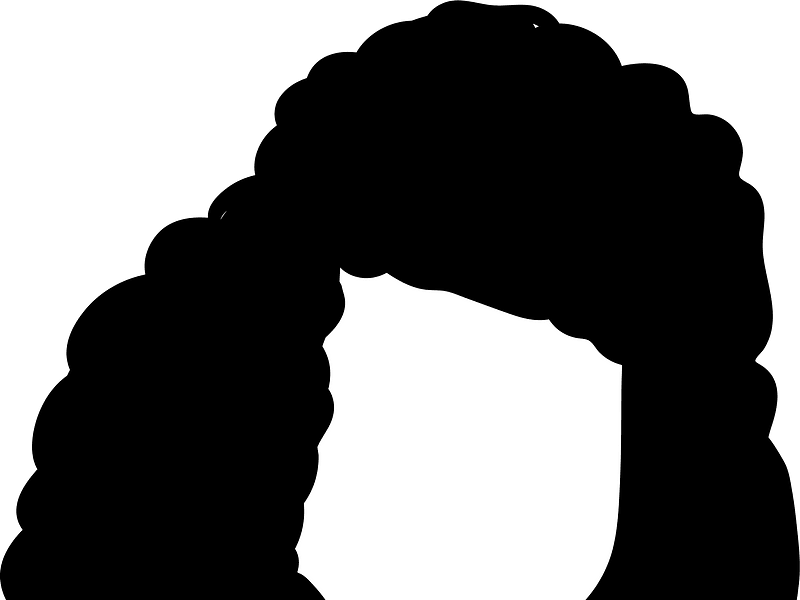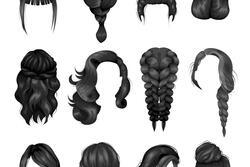Embracing My Curls, Embracing My Jewish Femininity
A resounding snap startles me, causing my heart rate to increase. I locate the guilty hair tie lying two yards away on the floor—broken. My hair has won again.
Though it still surprises me when my ponytail holder is overpowered by my wild hair, this experience is a common one for me. My hair has always been curly; photo albums in my basement show two-year-old me, hand on my hip and full of sass, with a head full of brown curls erupting like a volcano. My mom—who is blessed with sleek blond hair that constantly looks like she just had a blowout—never knew what to do with my hair when I was little. She’d try to tame my wild curls but brushing them out left a frizzy cloud around my head that could not be held in place by headbands or ponytails. She usually admitted defeat and ended up braiding my hair into neat plaits. As a result, I spent most of my childhood with my unruly hair hidden in the folds of my chestnut braids. On the rare occasions that I wore my hair curly, I felt self-conscious about my ringlets, worried that I wasn’t conforming to the beauty standards that told me I needed straight hair to look presentable.
As I grew older and more independent, I admired my curly-haired friends’ locks and began to ask for advice. I developed a hair routine. I started wearing my hair down more and grew more confident in my curls, emphasizing them an integral part of my appearance.
After I started wearing my curls loose and free, people started telling me how “Jewish” my hair looked. “Wow,” a friend once commented, “you don’t even need a kippah or a skirt for people to know that you’re Jewish.” This statement has proven true, with strangers speaking Hebrew to me, wishing me a good shabbos, and making various references to my Jewishness. My outwardly “Jewish” appearance, however, has also made me a target for antisemitism, eliciting stares and derogatory comments from strangers. The stereotypical image of a Jew typically expressed in media is an image of a person with conservative dress and curly hair similar to mine. As someone who wears pants, tank tops, and t-shirts, I don’t always appear “identifiably Jewish.” Knowing that I have this feature that makes my Judaism “apparent,” however, is both daunting and comforting. I’m aware of the negative reactions my identity can elicit, but I am also proud of my heritage and glad to know that I share an identifiable bond with my community.
My hair also serves as a symbol of my femininity; hair has long been a way for women to express themselves, and releasing my hair from plaits into long, wild, curls allowed me to define my own beauty standards and embrace my appearance. I love leaving my curls down to frame my face; I finally feel comfortable with my hair and feel beautiful letting it be free. Since a young age, I have whitened my teeth, carefully applied makeup to accentuate my features, and picked clothing that I consider flattering and trendy. Although I strive for order in other parts of my appearance, knowing that my natural, unrestrained hair is still an integral part of my appearance comforts me and reminds me that my un-styled self is still beautiful. Now that I always wear a mask in public, hiding half of my face makes my hair an even more prominent feature.
Throughout my life, as I’ve explored how my hair symbolizes both my Jewishness and my femininity, I’ve come to an important conclusion: these parts of me are intrinsically related and can’t exist without each other. As an Orthodox woman, my gender identity affects my religious practice, and my religious practice affects the way I present my femininity.
Both my religious practice and my identity as a woman have been points of self-consciousness for me; I have often felt ashamed of my Jewishness and my femininity and have felt that my identities make me somehow inferior. In a country dominated by patriarchal values and Christian hegemony, I grew up regarding my Jewishness and femininity as weaknesses. However, as I’ve grown and matured, I have become proud of my Judaism and my femininity, recognizing that they make me who I am. I wear my curls loose to embrace that I am a Jew and a woman, and I am proud to be both.
My hair doesn’t only destroy hair ties; it also destroys my insecurities about my Jewishness and femininity, and it teaches me to embrace my Jewish heritage, my natural beauty, and the intersection of my identities. I still struggle with questions about each of these aspects of my identity, and I still have bad hair days where I end up collecting my curls in a messy bun. But I have learned to take control of my identity and my hair; now, I have good hair days too.
This piece was written as part of JWA’s Rising Voices Fellowship.








Brava, Simone! Your essay examines and defines your identity through your symbolic use of your hair for both your religion and your femininity. Your opening image grabbed my attention, and your use of your extended metaphor worked. I look forward to reading more of your work, for you will be a voice for your generation.